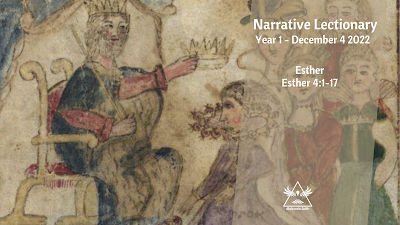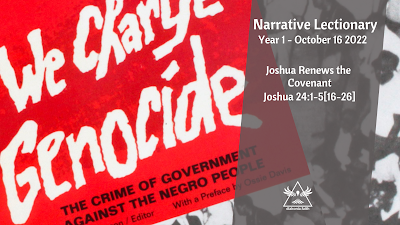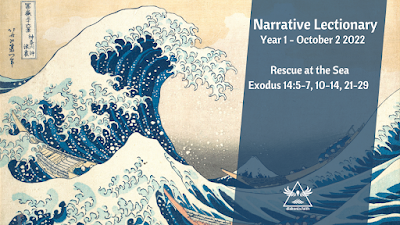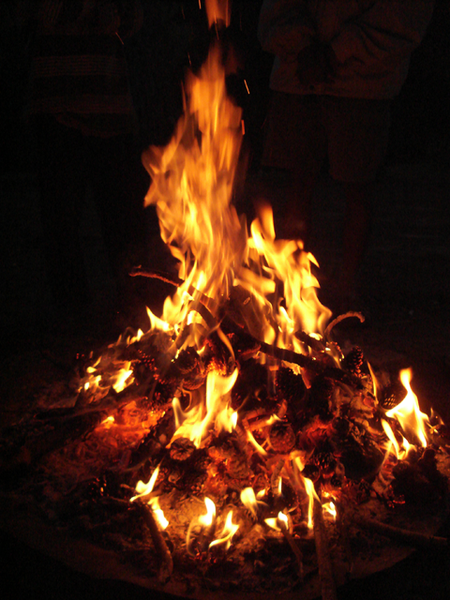Tuesday, November 29, 2022
Queerying Narrative Lectionary 114
Esther 4:1-17
1When Mordecai learned all that had been done--King Xerxes and the noble person Hamman had decided to kill the Jewish people because Mordecai, who was Jewish himself, was not paying appropriate tribute to Hamman--Mordecai tore his clothes and put on sackcloth and ashes, as you do, and went through the city, crying, wailing, and weeping bitterly. 2He went up to the entrance of the king’s gate, for no one might enter the king’s gate half naked like he was, donned only in his sackcloth 3In every province, wherever the king’s command and his decree about sending the Jewish people to death came, there was great mourning among the Jews, with fasting and weeping and lamenting, and most of them lay in sackcloth and ashes.
4Esther's handmaidens and castrated servants came and told her what was going on with Mordecai half naked outside the gate. The queen was deeply distressed; she sent garments to clothe Mordecai, so that he might take off his sackcloth and be able to enter the king's gate; but he would not accept them. 5Then Esther called for Hathach, one of the king’s castrated servants who had been appointed to serve her, and Esther ordered them to go to Mordecai to learn what was happening and why. 6Hathach went out to Mordecai in the open square of the city in front of the king’s gate, 7and Mordecai told them all that had happened to him, and the exact sum of money that Haman had promised to pay into the king’s treasuries for the destruction of the Jewish people. 8Mordecai also gave them a copy of the written decree issued in Susa for the destruction of the Jewish people so that Hathach might show it to Esther, explain it to her, and charge her to go to the king to make supplication to him and hopefully get him to change his mind on behalf of her people.
9Hathach went and told Esther what Mordecai had said. 10Then Esther spoke to Hathach and told them to reply to Mordecai with the following: 11"Everyone knows, from the king's slaves to the nobility, that if anyone goes to the king inside the inner court without being summoned by him, there is but one law—all are to be put to death. Only if the king holds out the golden scepter to someone, may that person live. I myself have not been called to come into the king's chamber for a month." 12When they told Mordecai what Esther had said, 13Mordecai told them to reply to Esther, "Even in the king's palace and as his wife, don't think you will have a better chance of escaping his genocide than the rest of the Jewish people. 14For if you keep silence at such a time as this, relief and deliverance will still rise up for the Jews from another path, but you and your extended family will still perish. Who knows? Perhaps you have come into your place as queen in the palace for just such a time as this." 15Then Esther replied to Mordecai, 16"Go, gather all the Jewish people to be found in Susa and hold a fast on my behalf. Do not eat nor drink for three days, night or day. I and my servants will also fast as you do. After those three days have passed, I will go to the king, even though it is against the law; and if I am murdered, I am murdered. So be it." 17Mordecai then went away and did everything as Esther had requested of him.
Queeries for the text:
What is this text building on?
What is the accompanying reading?
Where is this text headed?
Who was Esther?
What are different models of leadership? What makes a good leader?
How can you be an ally to a marginalized and/or oppressed group with your power?
What is genocide?
What can you do in such a time as this?
What are your queeries?
Wednesday, October 12, 2022
Queerying Narrative Lectionary 106
Joshua 24:1-15
Joshua assembled all the tribes of Israel at Shechem. He summoned Israel’s elders and commanders, magistrates and officers; and they presented themselves before God. Then Joshua said to all the people, “Thus said the Becoming One, the God of Israel: In past times, your ancestors—Terah, father of Abraham and father of Nahor—lived beyond the Euphrates and worshiped other gods.
But I took your father Abraham from beyond the Euphrates and led him through the whole land of Canaan and multiplied his offspring. I gave him Isaac, and to Isaac I gave Jacob and Esau. I gave Esau the hill country of Seir as his possession, while Jacob and his children went down to Egypt.
“Then I sent Moses and Aaron, and I plagued Egypt with the wonders that I wrought in their midst, after which I freed you— I freed your ancestors—from Egypt, and you came to the sea. But the Egyptians pursued your ancestors to the Sea of Reeds with chariots and horses. Your ancestors cried out to the Becoming One, and Xe put darkness between you and the Egyptians; then Xe brought the sea upon the Egyptians, and it covered them. Your own eyes saw what I did to the Egyptians.
“After you had lived a long time in the wilderness, I brought you to the land of the Amorites who lived beyond the Jordan. They battled you, but I delivered them into your hands; I annihilated them for you, and you took possession of their land. Then Balak son of Zippor, the king of Moab, made preparations to attack Israel. He sent for Balaam son of Beor to curse you, but I refused to listen to Balaam; he had to bless you, and thus I saved you from him.
“Then you crossed the Jordan and you came to Jericho. The citizens of Jericho and the Amorites, Perizzites, Canaanites, Hittites, Girgashites, Hivites, and Jebusites fought you, but I delivered them into your hands. I sent a plague ahead of you, and it drove them out before you just like the two Amorite kings—not by your sword or by your bow. I have given you a land for which you did not labor and towns which you did not build, and you have settled in them; you are enjoying vineyards and olive groves which you did not plant.
“Now, therefore, revere the Becoming One and serve Xyr with undivided loyalty; put away the gods that your ancestors served beyond the Euphrates and in Egypt, and serve the Becoming One. Or, if you are loath to serve the Becoming One, choose this day which ones you are going to serve—the gods that your ancestors served beyond the Euphrates, or those of the Amorites in whose land you are settled; but I and my household will serve the Becoming One.”
Queeries for the text:
What is this building on?
What is the companion text?
Where is this headed?
Who is missing from this text?
Who are the other gods that we serve?
How is darkness holy?
What does it mean to annihilate a people?
What must be done with the land stolen by God?
Where are other gods treated more favorably?
What are your queeries?
Tuesday, September 27, 2022
Queerying Narrative 104
Exodus 14:5-7, 10-14, 21-29
5When the Pharaoh was told that the Israelites had left Egypt, Pharaoh and his officials' minds were changed toward the people, and they said among themselves, “What have we done, letting our slaves leave our service?” 6So he had his chariot made ready and took his entire army with him: 7six hundred of the elite chariots and all the other chariots of Egypt with his best military commanders over them.
[…]
10As Pharaoh drew near, the Israelites looked back and saw the vast multitude of Egyptians advancing on them. In great fear the Israelites cried out to the Becoming One, 11 and said to Moses, “Why have you taken us to die here in the wilderness? Were there not enough graves in Egypt to bury us? What have you done to us, bringing us out of Egypt? 12Did we not tell you in Egypt, ‘Leave us alone so we can serve the Egyptians’? For we knew if we left there would be major ramifications to our safety.” 13But Moses said to the people, “Do not be afraid, remain steadfast, and see how the Becoming One will bring deliverance for you, for the Egyptians whom you see today you shall never see again. 14The Becoming One will fight your oppressors on your behalf, and you have only to keep still.”
[…]
21At the Becoming One's command, Moses stretched out his hand over the sea. The Becoming One sent such a strong east wind toward the sea that it turned the sea into dry land, and the waters were divided. 22The Israelites went into the sea on dry ground with waters forming a great wall for them on their right and on their left. 23The Egyptians pursued and went into the sea after them, all of Pharaoh’s horses, chariots, and chariot drivers. 24At the morning watch the Becoming One, in the pillar of fire and cloud, looked down on the Egyptian army and threw the Egyptian army into a panic. 25Xe clogged their chariot wheels so that they could barely turn. The Egyptians said, “Let us flee from the Israelites, for the Becoming One is fighting on their side against us!”
26Then the Becoming One said to Moses, “Stretch out your hand over the sea, so that the water may come back upon the Egyptians and their army.” 27So Moses stretched out his hand over the sea, and at dawn the sea returned to its normal depth. As the Egyptians fled before it, the Becoming One tossed the Egyptian army into the sea. 28The waters returned and covered the chariots and the chariot drivers, the entire army of Pharaoh that had followed them into the sea; all of them were drowned in the sea. 29 But the Israelites walked on dry ground through the sea, the waters forming a wall for them on their right and on their left.
Queeries for the text:
What is this passage building on?
What's missing?
What is the accompanying text?
Where is this headed?
How are the seas affected today?
What would the parting of the sea look like?
How are justice and freedom traded for capital gain?
How does war between an oppressing force and an oppressed force play out?
When is it okay to doubt God's plan?
What are your queeries?
 |
| The Great Wave off Kanagawa by Katsushika Hokusai, 1831 |
Thursday, September 23, 2021
Queerying 18th after Pentecost B
 River Needham, MA ThM queeries the Tanakh reading.
River Needham, MA ThM queeries the Tanakh reading.Tanakh: Esther 7:1-6, 9-10; 9:20-22
So the king and Haman came to feast with Queen Esther.
On the second day, the king again asked Esther at the wine feast, “What is your wish, Queen Esther? It shall be granted you. And what is your request? Even to half the kingdom, it shall be fulfilled.”
Queen Esther replied: “If Your Majesty will do me the favor, and if it pleases Your Majesty, let my life be granted me as my wish, and my people as my request. For we have been sold, my people and I, to be destroyed, massacred, and exterminated. Had we only been sold as bondspeople, I would have kept silent; for the adversary is not worthy of the king’s trouble.”
Thereupon King Ahasuerus demanded of Queen Esther, “Who is he and where is he who dared to do this?”
“The adversary and enemy,” replied Esther, “is this evil Haman!” And Haman cringed in terror before the king and the queen.
[...]
Then Harbonah, one of the eunuchs in attendance on the king, said, “What is more, a stake is standing at Haman’s house, fifty cubits high, which Haman made for Mordecai—the man whose words saved the king.” “Impale him on it!” the king ordered.
So they impaled Haman on the stake which he had put up for Mordecai, and the king’s fury abated.
[...]
Two chapters later
Mordecai recorded these events. He sent dispatches to all the Jews throughout the provinces of King Ahasuerus, near and far, charging them to observe the fourteenth and fifteenth days of Adar, every year— the same days on which the Jews enjoyed relief from their foes and the same month which had been transformed for them from one of grief and mourning to one of festive joy. They were to observe them as days of feasting and merrymaking, and as an occasion for sending gifts to one another and presents to the poor.
Queeries for the text:
What is missing from this text?
Why did Haman want to kill the Jews?
How is this celebrated today?
When is genocide okay?
How are Jews oppressed today?
-----
Queerying Mark 9:38-50
What are your queeries?
Thursday, September 3, 2020
Queerying 14th after Pentecost A
River Needham M.A., queeries the Tanakh reading.
Tanakh: Exodus 12:1-14
The Becoming One said to Moses and Aaron in the land of Egypt: This month shall mark for you the beginning of the months; it shall be the first of the months of the year for you.
Speak to the whole community of Israel and say that on the tenth of this month each of them shall take a lamb to a family, a lamb to a household. But if the household is too small for a lamb, let them share one with a near neighbor, in proportion to the number of persons: you shall contribute for the lamb according to what each household will eat. Your lamb shall be without blemish, a yearling male; you may take it from the sheep or from the goats. You shall keep watch over it until the fourteenth day of this month; and all the assembled congregation of the Israelites shall slaughter it at twilight. They shall take some of the blood and put it on the two doorposts and the lintel of the houses in which they are to eat it. They shall eat the flesh that same night; they shall eat it roasted over the fire, with unleavened bread and with bitter herbs.
Do not eat any of it raw, or cooked in any way with water, but roasted—head, legs, and entrails—over the fire. You shall not leave any of it over until morning; if any of it is left until morning, you shall burn it. This is how you shall eat it: your loins girded, your sandals on your feet, and your staff in your hand; and you shall eat it hurriedly: it is a passover offering to the Becoming One. For that night I will go through the land of Egypt and strike down every first-born in the land of Egypt, both human and animal; and I will mete out punishments to all the gods of Egypt, I the Becoming One.
How else has this story been queered?
When does the first of the year fall this year? Have the traditions changed? How?
Where else might we all contribute to ensure that everyone may be free?
Friday, April 10, 2020
Queerying the Easter Vigil
Queerier River Needham, MA queeries the Tanakh readings of the Easter Vigil.
Tanakh 1: Genesis 1:1-2:4a
Queeries for the text:
Who is the main character in this story?
Why was this creation narrative chosen?
Where is human's responsibility today?
Tanakh 2: Exodus 14:10-31, 15:1b-13, 17-18, 20-21
Queeries for the text:
What visceral feelings emerge when you hear this text?
Does this text show certain character(s) as unquestionably good? How can different viewpoints complicate that?
Could you sing the song of Moses after seeing so many people die?
What horrifies you about this story?
-----
Tanakh 3: Isaiah 55:1-11
Queeries for the text:
How does this utopian vision feel in an era of social distancing and CoViD-19?
What parts of our economic system do you want to change after reading this?
Does God care about the people who cannot afford to eat?
How are God's people remedying that?
-----
Tanakh 4: Ezekiel 37:1-14
Queeries for the text:
How can bones hear?
How can bones breathe?
How can hope emerge from despair?
How can the dead live again?
-----
Tanakh 5: Daniel 3:1-29
Queeries for the text:
How hot was the fire to kill people outside of it?
What kind of spiritual development does Nebuchadnezzar show in this text, if any?
Who went along and didn't ask questions or create difficulties for Nebuchadnezzar? What might the parallels to today be?
-----
Rev. Emily E. Ewing queeries the Gospel readings of the Easter.
Gospel 1: Matthew 28:1-10
Queeries for the text:
How does the world feel unstable today?
What is as shocking as lightning to us?
What happened to the guards after this?
What is with Jesus and Their feet?
What's going to happen in Galilee?
-----
Gospel 2: John 20:1-18
Queeries for the text:
How does Mary's fear about Jesus' body resonate in our context?
Who rolls up linen wrappings?
How are belief and understanding different?
What is the power of Naming?
What are your queeries?
Saturday, December 28, 2019
Queerying Christmas 1A
Tanakh: Isaiah 63:7-9
I will recount the kind acts of the Becoming One, the praises of the Becoming One— for all that the Becoming One has wrought for us, the vast bounty to the house of Israel that She bestowed upon them according to Her mercy and Her great kindness. She thought: surely they are my people, children who will not play false. So She was their deliverer. In all their troubles She was troubled, and the angel of Her presence delivered them. In Her love and pity She Herself redeemed them, raised them, and exalted them all the days of old.
Queeries for the text:
What are kind acts?
What kind acts has the Becoming One done?
What kind acts has the Becoming One done?
Who plays false?
What's a location of trouble in our world?
Where and how is there deliverance from this trouble in our world? How does God participate?
-----
Rev. Emily E. Ewing queeries the Gospel reading.
Gospel: Matthew 2:13-23
13Now after the magi had left, an angel of the Becoming One appeared to Joseph in a dream and said, “Get up, take the child and their mother, and flee to Egypt, and remain there until I tell you; for Herod is about to search for the child, to destroy them.” 14Then Joseph got up, took the child and their mother by night, and went to Egypt, 15and remained there until the death of Herod. This was to fulfill what had been spoken by the Becoming One through the prophet, “Out of Egypt I have called my child.”
16When Herod saw that he had been tricked by the magi, he was infuriated, and he sent and killed all the children in and around Bethlehem who were two years old or under, according to the time that he had learned from the magi. 17Then was fulfilled what had been spoken through the prophet Jeremiah:
18“A voice was heard in Ramah,
wailing and loud lamentation,
Rachel weeping for her children;
she refused to be consoled, because they are no more.”
19When Herod died, an angel of the Becoming One suddenly appeared in a dream to Joseph in Egypt and said, 20“Get up, take the child and their mother, and go to the land of Israel, for those who were seeking the child’s life are dead.” 21Then Joseph got up, took the child and their mother, and went to the land of Israel. 22But when he heard that Archelaus was ruling over Judea in place of his father Herod, he was afraid to go there. And after being warned in a dream, he went away to the district of Galilee. 23There he made his home in a town called Nazareth, so that what had been spoken through the prophets might be fulfilled, “They will be called a Nazorean.”
Queeries for the text:
What if Joseph had warned the other families with young children?
What children are being killed today?
How are we weeping with Rachel?
Which came first: Joseph's decision or God's affirmation of it?
How do dreams work on us?
Why does Matthew care so much about making sure "that what had been spoken through the prophet(s) might be fulfilled"?
What are your queeries?
Saturday, January 12, 2019
Queerying 2nd after Epiphany
This week, we're dedicating Queerying The Text to the memory of the Rev. Gordon Straw. Rev. Straw, an enrolled member of the Brothertown Indian Nation and an ever-growing force in Lutheran theological education, influenced both of us: Emily as a mentor and colleague and River as a professor and trusted mentor. You might notice Rev. Straw's influence flowing through our Queeries this week.
-Emily and River
-----
Periodic queerier, River Needham, queeries the reading from the Tanakh.
Tanakh: Isaiah 62:1-5
For the sake of Zion I will not be silent,
Queeries for the text:
Who is Jerusalem fighting?
Where else might we use flaming torches today? How are flaming torches harmful?
Which nations are treated unfairly today?
How are new names important?
What is a diadem?
Who is desolate, or has been forsaken? How does God delight in them?
-----
Rev. Emily E. Ewing queeries the reading from the Gospel.
Gospel: John 2:1-11
On the third day there was a wedding in Cana of Galilee,
6Now standing there were six stone water jars
11Jesus did this,
Queeries for the text:
On which third day?
Who was getting married in Cana? How were Jesus, his mom, all the disciples and the wedding couple connected? What other connections were there?
How did the mother of Jesus know he could fix the wine problem?
Who were the servants? What was Jesus' mom's role at the wedding?
How much is 20-30 gallons?
What is the chief steward's role?
Is it good to have good wine late? Why does it matter?
How many other signs are there?
Why does it matter that it was in Cana of Galilee? How is location important?
Why is belief connected to the wine?
What is glory?
What are your queeries?
Wednesday, October 10, 2018
21st after pentecost year b - amos
Verses bracketed in Italics are omitted from the assigned reading.
Amos 5:6-7 [8-9] 10-15
Seek the Becoming One, and you will live, else She will rush like fire upon the House of Joseph and consume Bethel with none to quench it. Ah, you who turn justice into wormwood and hurl righteousness to the ground! [Who made the Pleiades and Orion, who turns deep darkness into dawn and darkens day into night, who summons the waters of the sea and pours them out upon the earth— Her name is the Becoming One! It is She who hurls destruction upon strongholds, so that ruin comes upon fortresses!] They hate the arbiter in the gate, and detest her whose plea is just. Assuredly, because you impose a tax on the poor and exact from them a levy of grain, you have built houses of hewn stone, but you shall not live in them; you have planted delightful vineyards, but shall not drink their wine. For I have noted how many are your crimes, and how countless your sins—you enemies of the righteous, you takers of bribes, you who subvert in the gate the cause of the needy! Assuredly, at such a time the prudent one keeps silent, for it is an evil time. Seek good and not evil, that you may live, and that the Becoming One, the God of Angel Armies, may truly be with you, as you think. Hate evil and love good, and establish justice in the gate; perhaps the Becoming One, the God of Angel Armies, will be gracious to the remnant of Joseph.
Queeries for the text:
How are darkness and light dependent on each other?
How does justice become wormwood?
What does prudence mean? Should we be prudent?
What does God of the Angel Armies mean? What might that mean for peace in our time?
What would Amos have called the constellations? What might this mean for followers of the stars? Why were two verses dropped in the middle of this text?
What are these financial practices called today?
What is the gate? What does justice at the gate look like? How are the needy cared for?
What are your queeries?
Tuesday, October 9, 2018
21st after pentecost year b - mark
Mark 10:17-31
17As Jesus was setting out on a journey,
23Then Jesus looked around and said to his disciples,
28Peter began to say to Jesus,
Queeries for the text:
Why does Jesus question his own goodness?
What does it mean for Jesus to love the man?
What does the young rich man lack?
What was the man grieving? What did he decide to do?
What does it mean for Jesus to call the disciples children?
Was Jesus really talking about a dromedary and sewing?
Who has left house, family, and fields today?
Which fields come with persecutions?
Who is last? Who is first? Why are they trading places?
What are your queeries?
I preached on this text this past weekend, so if you'd like to see a bit of the sermon that came from this queerying, check it out!
Saturday, August 25, 2018
15th after pentecost year b - deuteronomy
 |
| Image Description: A tree formed by ribbons of many colors. |
Deuteronomy 4:1-2, 6-9
1And now, O Israel, listen to the statutes and to the ordinances, which I teach you, and do them; that you may live, and go in and possess the land which the Becoming One, the God of your parents, gives to you.2You shall not add to the words which I command you, neither shall you take away from it, that you may keep the commandments of the Becoming One your God which I command you.
6Observe therefore and do them; for this is your wisdom and your understanding in the sight of the peoples, that, when they hear all these statutes, shall say: "Surely this great nation is a wise and understanding people." 7For what great nation is there, that has God so close to them, as the Becoming One our God is whensoever we call upon Em? 8And what great nation is there, that has statutes and ordinances so righteous as all this law, which I set before you this day? 9Only pay attention to yourself, and keep your soul diligently, lest you forget the things which your eyes saw, and lest they depart from your heart all the days of your life; but make them known to your children and your children's children;
Queeries for the text
What are your queeries?








